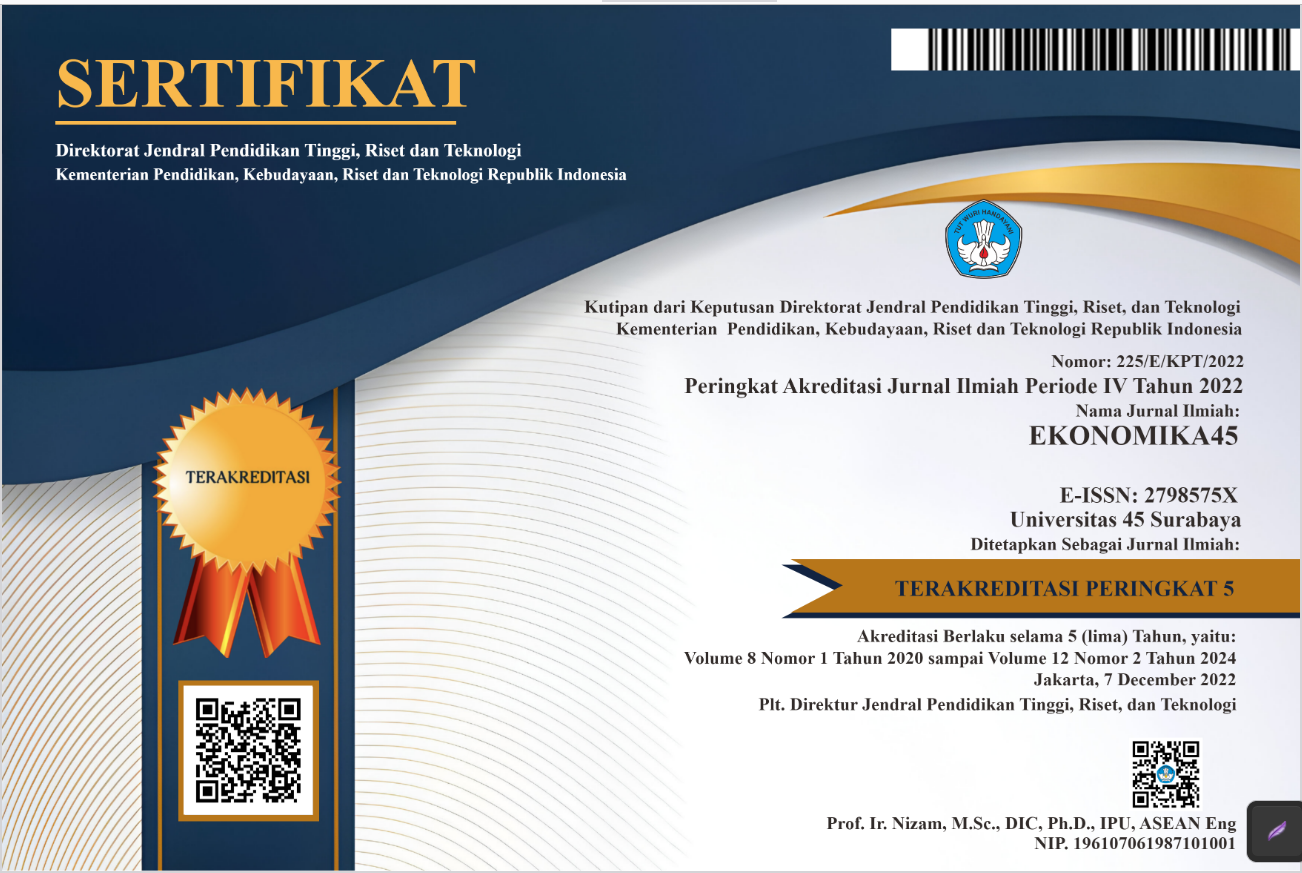PENGARUH ENTREPRENEURSHIP EDUCATION DAN INNOVATION CAPABILITY TERHADAP ENTREPRENEURIAL INTENTION DENGAN SELF EFFICACY SEBAGAI VARIABEL MEDIASI
DOI:
https://doi.org/10.30640/ekonomika45.v10i2.924Keywords:
entrepreneurship education, innovation capability, self efficacy, entrepreneurial intentionAbstract
This research was conducted to examine the effect of entrepreneurship education and innovation capability on entrepreneurial intention with self-efficacy as a mediating variable. The sample in this study were active students who took the Management study program in Surakarta using a random sampling technique. Collecting data using a questionnaire to 150 respondents. The data analysis tool in this study used smart PLS version 3.2.8, with testing the outer model and inner model. The results of this study indicate that (1) entrepreneurship education has a negative effect on entrepreneurial intention. (2) entrepreneurship education has a positive effect on self-efficacy. (3) innovation capability has a positive effect on entrepreneurial intention. (4) innovation capability has a positive effect on self-efficacy. (5) self-efficacy has a positive effect on entrepreneurial intention. (6) entrepreneurship education has a positive effect on entrepreneurial intention mediated by self-efficacy. (7) innovation capability has a positive effect on entrepreneurial intention mediated by self-efficacy.
References
A. Harianti, M. Malinda, N. Nur, H. L. Suwarno, Y. Margaretha, and D. Kambuno, “Peran Pendidikan Kewirausahaan Dalam Meningkatkan Motivasi, Kompetensi Dan Menumbuhkan Minat Mahasiswa,” J. Bisnis dan Kewirausahaan, vol. 16, no. 3, pp. 214–220, 2020, doi: 10.31940/jbk.v16i3.2194.
Daengs, G. S. A., Istanti, E., Negoro, R.
M. B. K., & Sanusi, R. (2020). The Aftermath of Management Action on Competitive Advantage Through Proccess Attributes at Food and Beverage Industries Export Import in Perak Harbor of Surabaya. International Journal Of Criminology and Sociologi, 9, 1418–1425.
D. D. Kusumojanto, B. S. Narmaditya, and A. Wibowo, “Does entrepreneurial education drive students’ being entrepreneurs? Evidence from Indonesia,” Entrep. Sustain. Issues, vol. 8, no. 2, pp. 454–466, 2020, doi: 10.9770/jesi.2020.8.2(27).
Enny Istanti1), Bramastyo Kusumo2), I. N.(2020).IMPLEMENTASI HARGA,KUALITAS PELAYANAN DAN PEMBELIAN BERULANG PADA PENJUALAN PRODUK GAMIS AFIFATHIN. Ekonomika 45, 8(1), 1–10.
M. Iswahyudi and A. Iqbal, “Minat Generasi Milenial Untuk Berwirausaha,” Assets J. Akunt. dan Pendidik., vol. 7, no. 2, p. 95, 2018, doi: 10.25273/jap.v7i2.3320.
D. A. L. Anggraeni and I. N. Nurcahya, “Pendidikan Kewirausahaan Terhadap Niat Fakultas Ekonomi dan Bisnis Universitas Udayana ( Unud ), Bali , Indonesia Pengangguran , kemiskinan , dan kesenjangan sosial merupakan masalah yang sering dihadapi oleh negara Indonesia sehingga menjadi tantangan be,” E-Jurnal Manaj. Unud, vol. 5, no. 4, pp. 2424–2453, 2016.
Iwa Soemantri, Asep et al. 2020.
Entrepreneurship Orientation Strategy, Market Orientation And Its Effect On Business Performance In MSMEs. Jurnal EKSPEKTRA Unitomo Vol. IV No. 1, Hal. 1-10.
M. Memon, B. A. Soomro, and N. Shah, “Enablers of entrepreneurial self-efficacy in a developing country,” Educ. Train., vol. 61, no. 6, pp. 684–699, 2019, doi: 10.1108/ET-10-2018-0226.
Rina Dewi, et al. 2020. Internal Factor Effects
In Forming The Success Of Small Businesses. Jurnal SINERGI UNITOMO, Vol. 10 No. 1, Hal. 13-21.
V. Souitaris, S. Zerbinati, and A. Al-Laham, “Do entrepreneurship programmes raise entrepreneurial intention of science and engineering students? The effect of learning, inspiration and resources,” J. Bus. Ventur., vol. 22, no. 4, pp. 566–591, 2007, doi: 10.1016/j.jbusvent.2006.05.002.
M. Z. Solesvik, P. Westhead, L. Kolvereid, and H. Matlay, “Student intentions to become self-employed: The Ukrainian context,” J. Small Bus. Enterp. Dev., vol. 19, no. 3, pp. 441–460, 2012, doi: 10.1108/14626001211250153.
U. Yousaf, S. A. Ali, and M. Ahmed, “From entrepreneurial education to entrepreneurial intention : a sequential mediation of self-e ffi cacy and entrepreneurial attitude,” 2020, doi: 10.1108/IJIS-09-2020-0133.
M. Rosique-blasco, A. Madrid-guijarro, and D. García-pérez-de-lema, “The effects of personal abilities and self-efficacy on entrepreneurial intentions,” pp. 1025–1052, 2018, doi: 10.1007/s11365-017-0469-0.
S. C. Santos and E. W. Liguori, “Entrepreneurial self-efficacy and intentions: Outcome expectations as mediator and subjective norms as moderator,” Int. J. Entrep. Behav. Res., vol. 26, no. 3, pp. 400–415, 2020, doi: 10.1108/IJEBR-07-2019-0436.
M. Elnadi and M. H. Gheith, “Entrepreneurial ecosystem, entrepreneurial self-efficacy, and entrepreneurial intention in higher education: Evidence from Saudi Arabia,” Int. J. Manag. Educ., vol. 19, no. 1, p. 100458, 2021, doi: 10.1016/j.ijme.2021.100458.
E. Herman, “Entrepreneurship Education and Entrepreneurial Intentions of College Students : The Mediating Role of Entrepreneurial Self-Efficacy and the Moderating Role of Entrepreneurial Competition Experience,” vol. 12, no. January, 2022, doi: 10.3389/fpsyg.2021.727826.
B. Bellò and V. Mattana, “The power of peers entrepreneurial intentions,” 2020, doi: 10.1108/IJEBR-07-2016-0205.









